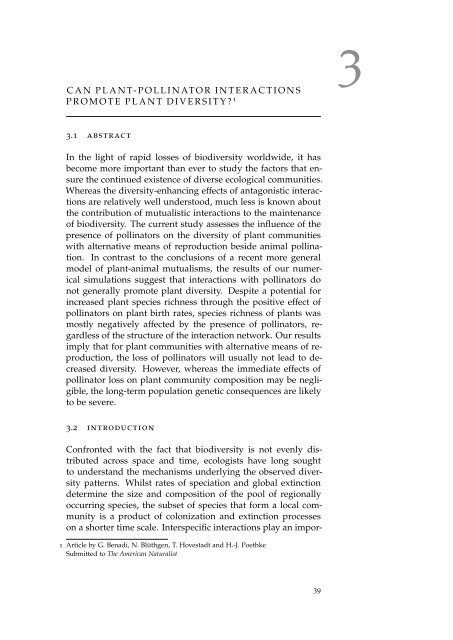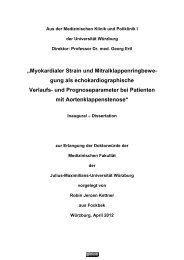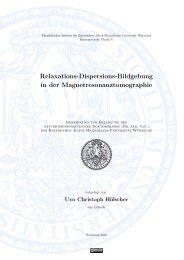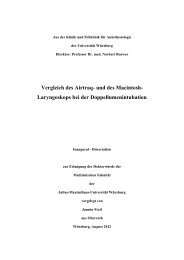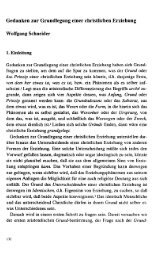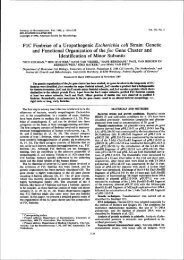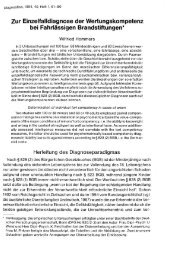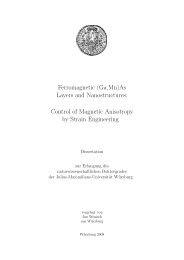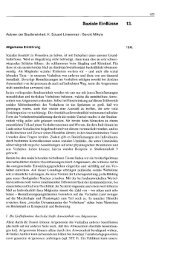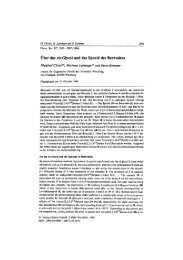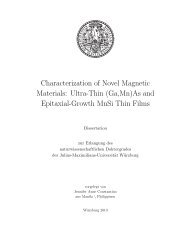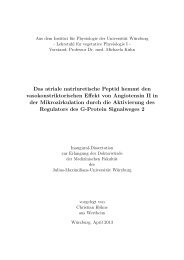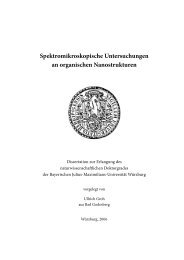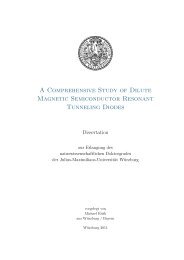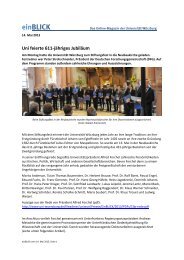Linking Specialisation and Stability of Plant ... - OPUS Würzburg
Linking Specialisation and Stability of Plant ... - OPUS Würzburg
Linking Specialisation and Stability of Plant ... - OPUS Würzburg
Create successful ePaper yourself
Turn your PDF publications into a flip-book with our unique Google optimized e-Paper software.
3<br />
C A N P L A N T- P O L L I N AT O R I N T E R A C T I O N S<br />
P R O M O T E P L A N T D I V E R S I T Y ? 1<br />
3.1 abstract<br />
In the light <strong>of</strong> rapid losses <strong>of</strong> biodiversity worldwide, it has<br />
become more important than ever to study the factors that ensure<br />
the continued existence <strong>of</strong> diverse ecological communities.<br />
Whereas the diversity-enhancing effects <strong>of</strong> antagonistic interactions<br />
are relatively well understood, much less is known about<br />
the contribution <strong>of</strong> mutualistic interactions to the maintenance<br />
<strong>of</strong> biodiversity. The current study assesses the influence <strong>of</strong> the<br />
presence <strong>of</strong> pollinators on the diversity <strong>of</strong> plant communities<br />
with alternative means <strong>of</strong> reproduction beside animal pollination.<br />
In contrast to the conclusions <strong>of</strong> a recent more general<br />
model <strong>of</strong> plant-animal mutualisms, the results <strong>of</strong> our numerical<br />
simulations suggest that interactions with pollinators do<br />
not generally promote plant diversity. Despite a potential for<br />
increased plant species richness through the positive effect <strong>of</strong><br />
pollinators on plant birth rates, species richness <strong>of</strong> plants was<br />
mostly negatively affected by the presence <strong>of</strong> pollinators, regardless<br />
<strong>of</strong> the structure <strong>of</strong> the interaction network. Our results<br />
imply that for plant communities with alternative means <strong>of</strong> reproduction,<br />
the loss <strong>of</strong> pollinators will usually not lead to decreased<br />
diversity. However, whereas the immediate effects <strong>of</strong><br />
pollinator loss on plant community composition may be negligible,<br />
the long-term population genetic consequences are likely<br />
to be severe.<br />
3.2 introduction<br />
Confronted with the fact that biodiversity is not evenly distributed<br />
across space <strong>and</strong> time, ecologists have long sought<br />
to underst<strong>and</strong> the mechanisms underlying the observed diversity<br />
patterns. Whilst rates <strong>of</strong> speciation <strong>and</strong> global extinction<br />
determine the size <strong>and</strong> composition <strong>of</strong> the pool <strong>of</strong> regionally<br />
occurring species, the subset <strong>of</strong> species that form a local community<br />
is a product <strong>of</strong> colonization <strong>and</strong> extinction processes<br />
on a shorter time scale. Interspecific interactions play an impor-<br />
1 Article by G. Benadi, N. Blüthgen, T. Hovestadt <strong>and</strong> H.-J. Poethke<br />
Submitted to The American Naturalist<br />
39


